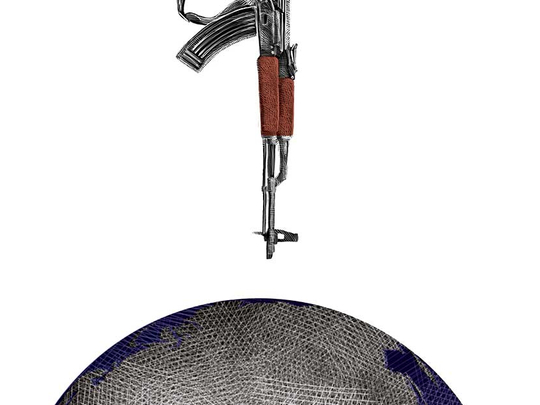
The question was clearly meant to be a trap. At the November 14 Democratic presidential debate, Bernie Sanders was asked if he still thought that climate change was “the most important threat for US security,” as the candidate had recently said. The day before, of course, Paris had been bloodied by terrorist attacks of unprecedented brutality in France, which seemed to relegate the urgency of the “climate emergency” for a lower level.
Sanders answered that he “absolutely” maintained his opinion. “Climate change is indeed directly related to the raised terrorist threat,” he said. “If we do not listen to what the scientists tell us, we will see countries around the world — that’s what the CIA says — fighting for access to water, to arable land, and we would see all sorts of conflicts arising.”
Drawing a link between security and climate change inspired mockery from some quarters. But this link is a certainty, and a sufficiently unpleasant one that we systematically forget it, only to see it raise its ugly head over and over again.
In March 2008, the High Representative of the European Union for Foreign Affairs and Security Policy forwarded an unambiguous report to member states on this very issue. Seven years after it was written, it clearly served as an eerily accurate warning. The text said that global warming acts as a “threat multiplier” in areas already suffering from social, political, religious or ethnic tensions.
“In the future, climate change is likely to affect the social and political stability in the Middle East and North Africa,” the report read, pointing to “tensions related to the management of water resources in the Jordan Valley and the Euphrates and Tigris rivers, which are becoming scarce” and the worsening tensions caused by rising temperatures.
The report also emphasised that there would be “a significant increase of the population in the Maghreb and the Sahel” in the coming years which, combined with climate change and the loss of agricultural land, could lead to a “political destabilisation” and an “increase in migratory pressures.”
Disturbingly, almost all the areas identified in 2008 as the most sensitive to global warming — from Mesopotamia to the Levant via Yemen, the Sahel and North Africa — are indeed marked by instability and chaos seven years later, tumult that directly contributed to the November 13 attacks.
Syria in particular is the subject of several studies examining the role of climate change in the civil war. Francesca de Chatel, a Middle East water management expert from Nijmegen’s Radboud University, in the Netherlands, delivered a striking chronicle published in the January 2014 Journal of Middle Eastern Studies. Chatel writes that the Syrian government has totally neglected environmental management.
Fostered by the current warming, a drought so severe that there’s been nothing like it since the beginning of weather records settled over the region between 2007 and 2010. The UN estimates that it affects at least 1.3 million Syrians. In 2008, the country had to import wheat for the first time in its history. The following year, more than 300,000 farmers left the country’s northeast because they couldn’t continue working. It’s not just lack of rain that’s problematic but also continued overexploitation of ground waters since the 1980s, which have combined to leave 17 per cent of the Syrian population food insecure.
Environmental factors don’t invalidate others — religious, political, ethnic, etc. But their role is clear. It’s foolish to think that the partial destruction of a country’s primary production has no effect on the stability and security of its neighbours.
In a study published in May’s Journal of Development Economics, Swiss economists Matthias Fluckiger and Markus Ludwig demonstrated remarkably well the link between the environment and security. They analysed data on acts of piracy in about 100 countries, and on plankton abundance in the same waters. According to their calculations, when the amount of plankton is lowered, the number of acts of piracy increases in due proportion.
This isn’t as far-fetched as it may seem. In fact, it’s absolutely logical: Affected by global warming, plankton form the base of the marine food chain; when it is depleted, fishermen find themselves with boats that can no longer be used for fishing. They must therefore find another way to make money — and piracy is one.
With the November 13 attacks, Daesh (the self-proclaimed Islamic State of Iraqa and the Levant) has dominated the political agenda in the short term. The decisive COP21 climate conference that is scheduled to begin today in the French capital has become less of a priority, by virtue of circumstance. This is bad news for the fight against global warming. But for Daesh and those who thrive on the desperation of the poor, it’s a major victory.
Stephane Foucart is a journalist for Le Monde
© 2015 Worldcrunch — in partnership with Le Monde







